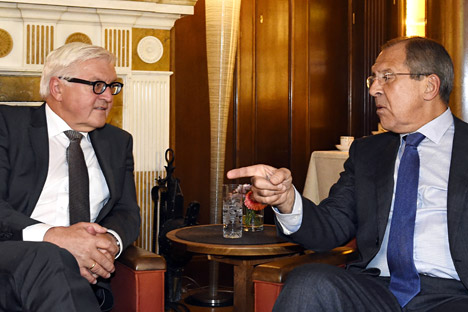
German foreign minister Frank-Walter Steinmeier (left) and Russian Foreign Minister Sergey Lavrov. Source: AP
APDespite a fresh round of talks between the foreign ministers of Russia, Ukraine, Germany and France in Berlin on Sept.13, the sides appear to be no closer to making a breakthrough on resolving the conflict in the Donbass region of eastern Ukraine, where a shaky ceasefire between government forces and pro-Russian rebels.
The key focus of negotiations was on elections in the Donbass, where the authorities of the rebel Donetsk and Lugansk “people’s republics” (DNR and LNR) have declared their intention to hold votes on Oct. 18 and Nov. 1, respectively, in defiance of the Minsk peace agreements signed in February, which stipulate that they must take place parallel to the general Ukrainian elections on Oct. 25.
Earlier, at a joint press conference with Ukrainian President Petro Poroshenko on Sept. 11 in Kiev, EU Commissioner for European Neighborhood Policy & Enlargement Negotiations Johannes Hahn said that he expected that the elections in eastern Ukraine would be transparent, free and open, and held in accordance with Ukrainian law.
"Now the West and Kiev will demand that Moscow cancel or move the Donbass elections to another date, while in response Moscow will raise the issue of Kiev not meeting the obligations stipulated in the Minsk agreements (for example, the full amnesty of militias that has not taken place)," said Alexander Gushchin, professor at the Russian State University for the Humanities.
Yet Russian officials claimed that the main topic of discussion during the meeting was not elections in the Donbass but matters relating to the implementation of the ceasefire.
"Currently, the subgroup on security of the contact group working in Minsk is discussing the agreement project to withdraw the less than 100-mm-caliber weapons," explained Russian Foreign Minister Sergei Lavrov, saying that the agreement project is 90 percent ready, but "the devil lies in the details."
Russian experts believe that the problem is not in the details but rather in the agenda of the talks, which are seeing constructive discussion only of the military aspects of the Minsk agreements, while there has been no progress on the political issues.
"Politically, the only way out may be the extension of the Minsk process because in the course of the year to come the sides will not be able to realize even 50 percent of the agreement," said Alexander Guschin.
Kirill Koktysh, professor of political theory at the Moscow State Institute of International Relations, was quick to blame Kiev for the political impasse, while ignoring the rebels’ failure to set election dates in accordance with the conditions of the Minsk agreements.
"The political problems bear a systematic nature – Kiev is incapable of implementing the Minsk agreements in the form in which they were signed. It tries either to interpret them to its advantage or provoke their failure," he said.
A key obstacle to progress in the negotiations toward a settlement of the crisis is that the participants of the talks cannot agree on the issue of decentralization.
"Although all sides agree on the necessity of federalizing Ukraine, they are still discussing the form in which this will take place. The version that is being considered in Kiev obviously does not suit the DNR and LNR,” said Dmitry Ofitserov-Belsky, a professor at the Higher School of Economics in Moscow.
“Moreover, the question of the economic restoration of the Donbass and the return of refugees is brewing. This will definitely become a source of new contradictions once peace is established," he said.
According to Dmitry Ofitserov-Belsky, despite the fact that the peace process is moving at a slow pace, it remains of great value.
"Yes, the ceasefire is not working completely, but the withdrawal of weapons reduces the intensity of clashes and the possibility of large-scale military operations," he said.
Kirill Koktysh, meanwhile, is looking at the future (first of all the next set of talks on the crisis, penciled in for October) with cautious optimism.
"The context has expanded and Europe is facing a series of new challenges. If we remember [German Chancellor Angela] Merkel's last statement about how the EU will not be able to manage the refugee problem without Russia, we can presume that the summit will yield unexpected decisions," he said.
If Moscow and Europe agree, then the main objective of the peace negotiations will be considered to have been reached.
"The civil war in Ukraine will end when Russia, France and Germany come to an agreement," said Ofitserov-Belsky.
All rights reserved by Rossiyskaya Gazeta.
Subscribe
to our newsletter!
Get the week's best stories straight to your inbox